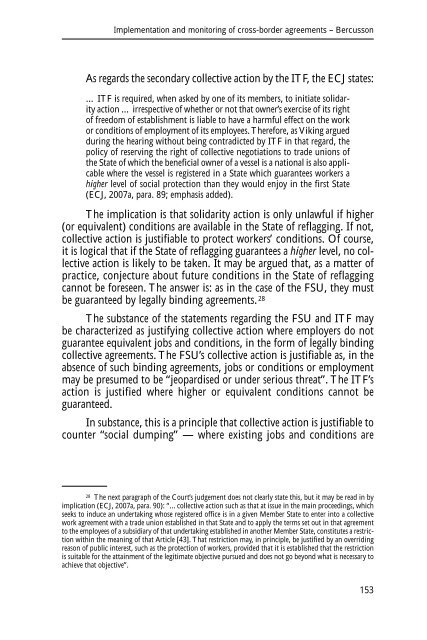CROSS-BORDER SOCIAL DIALOGUE AND AGREEMENTS: An ...
CROSS-BORDER SOCIAL DIALOGUE AND AGREEMENTS: An ...
CROSS-BORDER SOCIAL DIALOGUE AND AGREEMENTS: An ...
You also want an ePaper? Increase the reach of your titles
YUMPU automatically turns print PDFs into web optimized ePapers that Google loves.
Implementation and monitoring of cross-border agreements – Bercusson<br />
As regards the secondary collective action by the ITF, the ECJ states:<br />
… ITF is required, when asked by one of its members, to initiate solidarity<br />
action … irrespective of whether or not that owner’s exercise of its right<br />
of freedom of establishment is liable to have a harmful effect on the work<br />
or conditions of employment of its employees. Therefore, as Viking argued<br />
during the hearing without being contradicted by ITF in that regard, the<br />
policy of reserving the right of collective negotiations to trade unions of<br />
the State of which the beneficial owner of a vessel is a national is also applicable<br />
where the vessel is registered in a State which guarantees workers a<br />
higher level of social protection than they would enjoy in the first State<br />
(ECJ, 2007a, para. 89; emphasis added).<br />
The implication is that solidarity action is only unlawful if higher<br />
(or equivalent) conditions are available in the State of reflagging. If not,<br />
collective action is justifiable to protect workers’ conditions. Of course,<br />
it is logical that if the State of reflagging guarantees a higher level, no collective<br />
action is likely to be taken. It may be argued that, as a matter of<br />
practice, conjecture about future conditions in the State of reflagging<br />
cannot be foreseen. The answer is: as in the case of the FSU, they must<br />
be guaranteed by legally binding agreements. 28<br />
The substance of the statements regarding the FSU and ITF may<br />
be characterized as justifying collective action where employers do not<br />
guarantee equivalent jobs and conditions, in the form of legally binding<br />
collective agreements. The FSU’s collective action is justifiable as, in the<br />
absence of such binding agreements, jobs or conditions or employment<br />
may be presumed to be “jeopardised or under serious threat”. The ITF’s<br />
action is justified where higher or equivalent conditions cannot be<br />
guaranteed.<br />
In substance, this is a principle that collective action is justifiable to<br />
counter “social dumping” — where existing jobs and conditions are<br />
28<br />
The next paragraph of the Court’s judgement does not clearly state this, but it may be read in by<br />
implication (ECJ, 2007a, para. 90): “…collective action such as that at issue in the main proceedings, which<br />
seeks to induce an undertaking whose registered office is in a given Member State to enter into a collective<br />
work agreement with a trade union established in that State and to apply the terms set out in that agreement<br />
to the employees of a subsidiary of that undertaking established in another Member State, constitutes a restriction<br />
within the meaning of that Article [43]. That restriction may, in principle, be justified by an overriding<br />
reason of public interest, such as the protection of workers, provided that it is established that the restriction<br />
is suitable for the attainment of the legitimate objective pursued and does not go beyond what is necessary to<br />
achieve that objective”.<br />
153
















